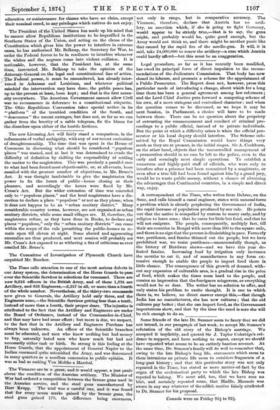A correspondent of the Times, who writes from Debree, on
the Sone, and calls himself a canal engineer, states with unusual force a problem which is already perplexing the Government of India, the rapid increase of population produced by our rule. He points out that the native is compelled by custom to marry early, and by religion to leave sons ; that he cares for little but food, and that he will not emigrate. The people, consequently, multiply fast, till their are counties in Bengal with more than 500 to the square mile, and there is no sign that the process is diminishing in pace. Formerly war, pestilence, and famine thinned out the people, but we have prohibited war, we resist pestilence—unsuccessfully though, as the history of Burdwan shows—and we have this year de- feated famine. Increasing food by irrigation only increases the mouths to eat it, and of manufactures in any form ex- tensive enough to enable the people to import food there is little chance. The consequence of this growth of demand, with- out any expansion of culturable area, is a gradual rise in the price of food, which makes the times seem hard to the people, and creates an impression that the foreigners misgovern, or everything would not be so dear. The writer has no solution to offer, and only states his problem to excite thought. It is one to which there is, we believe, no direct answer except this,—that though India has no manufactures, she has new cultures ; that the old cultures pay better ; that she can import food, as the Government importations show, and that by the time the need is sore she will be rich enough to do so.






























 Previous page
Previous page